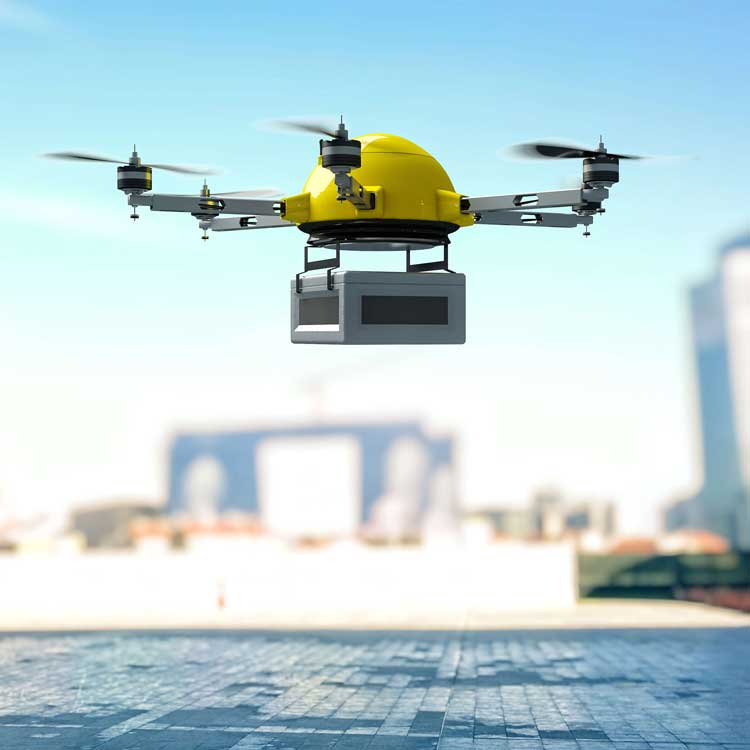Maron Kristófferson: We get about 10 to 20 years of bad weather, British weather, in one year. We are capable of flying during rain, but this is something we are still testing.
Jason Lopez: And there’s a good side to having bad weather.
Maron Kristófferson: We get to test out things in one week that other companies might spend three or four months of just waiting for the right conditions to get to test that. So we always have a chance to test rain, wind, you know, and all different conditions.
Jason Lopez: But as you heard a moment ago, public perception is a bigger challenge than the weather.
Maron Kristófferson: The noise, which is the biggest complaint. When you talk to authorities, everybody, everybody is worried about noise. The noise is significantly less than what you will hear from a highway or a road
Jason Lopez: Kristófersson says drones are a very malleable platform to develop on. They are capable of transporting goods or people more efficiently than an electric car. And he points out an electric car more efficient than the gasoline car. Cars are complex.
Maron Kristófferson: If you think about what we are doing today, it doesn't make much sense. They are complex. The infrastructure for them are complex. Even the regulations are complex. Now you have to have a delivery driver who most likely doesn't want to work as a driver in the car. And there's high demand fluctuation of fluctuation over the day, which makes it very hard to scale economically. Now drones are simple machines. There's a few wires. There's a battery. This flight, computer DPS, and the technology around this has kind of caught on following the smartphone. This is simple, easy to replace. And we have 10 operators in the company. Every one of them can disassemble a drone and rebuild it again. It is much simpler to operate than a fleet of cars.
Jason Lopez: Aha’s drone delivery service is being done in a partnership with the Israeli drone developer, Flytrex. Kristófersson says 2017 they got a license for their first flight route. Today they have more than 10 routes and can serve more than half of Reykjavik wth drones… the other half by car. Eventually, he thinks delivery by car will go away.
Maron Kristófferson: The drones are getting cheaper, safer. They're getting better, water proven, and they're getting more mass produced. These are extremely stable machines. So the seventh generation of the system allows us to deliver to backyards. We have a license to deliver to 22,500 homes, approximately. All we need is the permission from the person receiving it. The operator only has to put the packets in the drawer and press a button, and it goes to the right spot.
Jason Lopez: So, let’s think what the future is literally going to look like in as little as 10 years. But in order to do that, consider that if you were born in 1860, there was no electricity, no telephones, no radio, no automobiles, no airplanes… yet within your lifetime all of these came into being as every day things. In an interview with The Forecast editor-in-chief Ken Kaplan, Kristófersson says a similar phenomenon is in store for drone technology.
Maron Kristófferson: Airbus made a very interesting study about this, where they predicted that there would be 20,000 unmanned aircraft every hour over the city of Paris, about 16,000 of those were delivery drones, but it's really hard to predict these things. And it's really hard to be in the position of having to choose a system to regulate these things in advance before you know exactly what they're going to be like.
Ken Kaplan: There are going to be many changes coming. So in your world, just describe, how you communicate that to people. Like what you do today is going to change in this way…
Maron Kristófferson: Referring back to the study by Airbus saying that, that, that you have 20,000 a month aircraft flying over the city of Paris in, in 10, 15 years. How many birds do you think of flying over Paris today? So, and they are flying at lower altitudes in many cases. And many of these drones will actually, you know, the longer the journey, the higher the altitude most likely.
Ken Kaplan: Tell me about your company. We should just get that...
Maron Kristófferson: So we've started focusing on the software side, on building a platform for traditional retailers to serve their local area faster and better than Amazon ever could, because I believe the Walmart effect is repeating itself with Amazon today. So, so at the same time we are doing this, we have been building our business on this platform in Iceland and on exactly this promise that we can offer the local customers in Iceland, much faster and better service than Amazon never could. And right now, so we right now deliver hot food groceries, retail products from about 130 sellers in Iceland. So if you look at, from our partnership strategy, our name is built on the Icelandic slogan, “Allra hagur,” which means, you know, “everybody wins” or “everybody benefits,” more like a win-win strategy. And the Aha comes from those two words, “Allra” and “hagur.”
Maron Kristófferson: This is something that has to really, really been woven into our culture, our values and everything we've done from the beginning. So we're very much focused on bringing in retailers that are actually beneficial to the customers, and it's beneficial for them to be part of the platform and it's beneficial to us. So our focus there is to make sure that for traditional retailer that comes onto our platform in Iceland or wherever it is that they do not have to think about technology at all. We basically take the technology, you know, whole conversation out of the picture and say, you don't have to worry about this. You have an accounting system, you have a list of SKUs, we'll upload them. We'll take care if you don't have pictures, we'll deal with that. So, so, so this, this whole thing of allowing traditional retailers to maintain their strengths in being shoemakers, in being fashion, you know, consistent in being, you know, good with furniture is very much in our mantra because it's really hard for somebody and we've talked to so many business leaders that we've seen grow over the last 30 to 40 years in Iceland, in their retail space. It's really hard for them to all of a sudden, have to turn into a technology expert. They can't, they don't want to, and, and it really frustrates them. And I think that's really that's really much more the problem that they are seeing the opportunity. They understand the opportunity, but they just don't want to go there. They don't want to reinvent themselves at the later stage of their business life. And, and, and it's also really hard for them to go there because it's a much more fast moving space than they used to.
Ken Kaplan: In this new era. Part of it is, is teaching how to let go of feeling like you have to own and build everything yourself.
Maron Kristófferson: Absolutely. I mean, this is of course something we face, we are talking to some very strong international brands right now that are kind of now after having run, not invented here strategy for, you know, tens of years successfully, kind of now starting to realize maybe it's actually better, that somethings are invented elsewhere and are actually brought forward elsewhere. Not only for the reason that they are not smart inventors, but more so for the reason that they can then be a part of an ecosystem that they, you know, works. There might be other parties to the ecosystem elsewhere in the world that are actually helping them develop the platform. In a way you probably know this from Nutanix, it's a similar kind of almost a community of businesses that benefit from each others.
Ken Kaplan: You mentioned Amazon and their, their business approach was especially around drones is pretty closed, right now. But you had an expression in there about how problematic that can be.
Maron Kristófferson: Aviation is a heavily regulated space. You cannot walk into the aviation authorities to say are 100% safe system. The first thing they will say, nothing is 100% safe. And the reason they say that is that they have decades of experience. They know exactly what they're doing. The problematic approach of the drone companies is that they are saying we are going to do everything ourselves. The aviation authorities, no one in the world, really like this. They prefer things to be broken up into silos where there are different parties with different responsibilities so that they can, eh, yeah, basically they are encouraging, pointing and creating a blame game for security purposes. We, of course, even if we are not so focused on drone technology ourselves, we have to be focused on drone technology. We have a master's in drone engineering, working for us, that verifies everything we bring in, because if something goes wrong, if a drone process or something like that, we ha we will always be responsible towards the authorities to explain, you know, why, and, and, and, and, and how things happened. So, so, you know, it's important that while we are not developing the technology, we need to understand it.
Ken Kaplan: The sense of responsibility of having one giant provider versus say several, and those several have providers that are helping or suppliers that are helping them, you feel like that's stronger.
Maron Kristófferson: Yes. I mean, I, I think I got my history, correct. But I think, you know, if you look into the history of Boeing, you will find exactly this example where, you know, I can't remember exactly when it was, when they were broken up into three companies. Exactly one of the reasons was this, you know, we can't have the same company selling the ticket, operating, you know, creating the machine and everything. It's going to be too hard to analyze and justify what went wrong when something went wrong. If you have only one single party that is responsible for the whole thing, multiple parties will question each other. They will look into their own faults, but they will also look very thoroughly into the faults of their partners.
Ken Kaplan: Okay. What's your, what's your vision? How do you see what you're working on with drones and the way you're coming, it's coming together.
Maron Kristófferson:First, we started looking into robots and drones, more out of interest. Then we saw that there were serious companies being built around the startups around drones, but there were not really many of them that were actually having any potential customer base. So we approached all of them. Then it became serious for us very quickly. And we started to see, look, the technology is actually already quite good, and it's going to get much better, very fast. So that's going to move forward. Now we kind of foresee that within three to five years, we will do 50% of our deliveries. We have drones. So I'm talking 50% of the distance in total will be delivered via drones. This is not going to be hindered. I hope in our case, by licensing because we already have a license and we already have the technology ready. What I'm more worried about would be the public perception. Now, once you get the public used to delivery drones that are maybe 15 to 20 kilos of weight, this is only going to scale upwards.
Jason Lopez: Aha has positioned itself, literally, to win the market and public confidence in drone deliveries. In the city of Reykjavik, they moved their office to the center of the city, near the busiest intersection in the country.
Maron Kristófferson: So we are right next to the busiest intersection and we can fly from there. The good thing about this office space is that we have access to two rooftops, which are 18 times 32 meters, and we're allowed to build basically drone ports on top of this. The perfect urban delivery drone does not exist, but the technology does. What I mean by that is all of the modules exist, but they do not exist on the same drone. And it's not that it's not possible. It's just, nobody has already seen the business in doing so, but I believe DDI will do it in the next few years. And there's an American company called sky deal that will probably do it as well.
Jason Lopez: Maron Kristófferson is the CEO of the online marketplace, Aha. This is the Tech Barometer podcast I’m Jason Lopez, Tech Barometer comes to you from The Forecast. You can find the Forecast at theforecastbynutanix.com.












